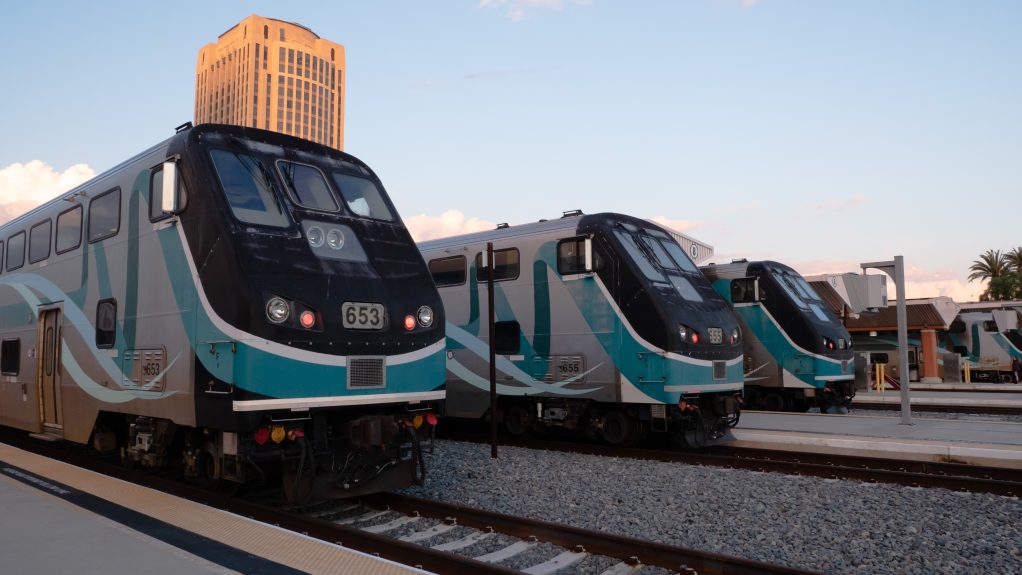In an effort to reduce carbon emissions, Metrolink received a new grant to provide free fares for students on all of its trains under the Student Adventure Pass program.
Metrolink hopes to increase the number of student riders, which will take polluting cars off of the road. Students must register with the Metrolink app and show their student ID to activate their pass.
Signing up for the Student Adventure Pass is easy — one only has to download the Metrolink app and register using their student email. After confirming their account, their Student Adventure Pass is loaded into the app and can be activated onboard the train. Students must also show their Student ID with the app when boarding.

Students of any grade or age can register for the program. Paper tickets from kiosks are also available.
The decreased emissions from riding trains instead of driving can have a positive impact in the fight against climate change. Robert Goodman, a professor at Citrus who teaches biology and environmental science, stressed the importance of taking action against climate change.
“We have to come up with ways to reduce our carbon footprint, reduce the amount of CO2 in the atmosphere,” he said. “Right now, worldwide humans are producing approximately 40 billion gigatons of CO2 to go up into the atmosphere every year, and when you collectively look at all the volcanoes on the globe, they’re only putting up on average 300 million metric tons.”
One such way is through utilizing mass transit, even if that mass transit produces GHG emissions.
“Well, it is burning fossil fuels, but the way you offset that is if you’re putting a lot of individuals on a single entity that’s utilizing it, that’s much better than 40, 50, 60 other people driving their own cars to get here,” Goodman said. “So, mass transportation is another way to reduce our carbon footprint.”
The California State Legislature has set the goal of combating climate change by reducing the state’s greenhouse gas emissions. One method to achieve this is through the Cap-and-Trade Program, which annually sets an allowance for greenhouse gas emissions and auctions them to companies. Revenue from the Cap-and-Trade Program is reinvested into other programs that seek to decrease GHG emissions.
One such program is the Low Carbon Transit Operations Program, which provides funding to transit agencies to improve services, and is the source of the grant. The funding lasts for six months and can be renewed for up to four years.
The Student Adventure Pass program started on Oct. 9 and will last for up to six months, or until grant funds are exhausted. Metrolink’s public relations manager, Chris Gutierrez, said in an email that if the program was successful, funding may be exhausted early. He added that Metrolink would pursue additional funding in the future following the program’s success.
Data is limited on the current effects of the program but shows signs of success in its mission to increase student riders.
“Since its implementation on Oct. 9, 22k+ new mobile student accounts have been created, 28k+ mobile tickets have been activated and more than 57k paper tickets have been retrieved,” Gutierrez said.
The closest Metrolink station to Citrus is the “Covina” station, at 600 N. Citrus Ave., about 3 miles south of the college. Foothill Transit’s 281 bus line connects the station to Citrus College and runs at 30-minute headways along Citrus Avenue.
The station is a part of Metrolink’s San Bernardino Line, which runs between LA Union Station and Downtown San Bernardino. The line connects to trains headed toward Ventura, Lancaster, Oceanside and the Perris Valley. There are also four Metro lines and regional Amtrak trains at LA Union Station.
The Student Adventure Pass applies only to Metrolink trains, however free transfers to Metro Rail and buses are available. The A (former Gold) Line station on Citrus Ave, named “APU/Citrus College Station” is a Metro Rail station. The GoPass provides free fares on Metro Rail and buses, including Foothill Transit, to Citrus students.
Before the Student Adventure Pass, Metrolink had a student discount program, which will eventually be reinstated.
Goodman said improved connections to Citrus created the opportunities for students on and off campus.
“I think they should assess how many students are using it,” he said. “It would be awesome if we could get more on campus classes and have more students on campus. We’re slowly starting to get back to pre-COVID scenario, the whole true college campus atmosphere, environment, students everywhere.”
The chair of the Board of Directors, Larry McCallon, said in a press release that he sees the program as an opportunity for connecting students to their current and future destinations.
“Currently, students only account for 17% of Metrolink’s ridership, but we want to see that number grow… we can introduce a new generation of potential riders to public transit as a safe and convenient mode of transportation for school, leisure and work.”


